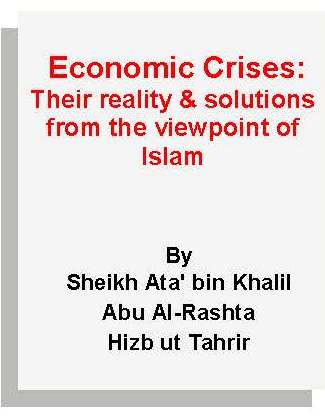- |
- font size decrease font size increase font size

بسم الله الرحمن الرحيم
Economic Crises: Their reality and solutions from the viewpoint of Islam
Sheikh Ata' bin Khalil Abu Al-Rashtah
Hizb ut Tahrir
To Download PDF: Click Here

Excerpt
Economic crisis means severe turmoil in the management of the financial matters of State, which requires effort to remove it. The crisis resulting from currency occurs in the gold-exchange system due to the political and economic domination of the State that owns the reserve currency over other States. It also occurs in the mandatory paper (fiat) moneys because they are subject to price fluctuations and speculation among nations, and to financial conspiracies that lead to political and economic unrest and economic collapse in financial markets. The treatment is to revert to the system of the gold standard, which preserves exchange rate stability, and economic prosperity.
The crisis resulting from the balance of payments due to deficits leads to indebtedness if the economy was not self stimulated and the loans are misused, particularly as the loans are fraught with the danger of extending influence, and also dangerous because of usury which is prohibited in Islam.
Recourse to the IMF complicates the problem because it treats it as an abstract mathematical equation, and demands increases to taxes, devaluation of currency, freezing or reducing wages and salaries, and removal of subsidies, besides increasing prices. It also designs its aid to develop projects, which instead of developing the wealth of the State makes it unable to dissociate itself from aid and loans. Thus, the country would enter into the indebtedness trap, from which it cannot escape. The maximum that the country which follows the IMF program can achieve then is the rescheduling of its debts ratherthan abolishing them. Besides, it facilitates the taking up of new loans, thus accumulating debts, such that it can not find a way out of them as is happening with all countries currently dealing with these programs.
Regarding the resolution of the crisis of unemployment and poverty resulting from the ill-distribution of wealth or from its insufficiency, this is achieved by job creation to the capable through projects established by the State, as well as the imposition of financial maintenance for the incapacitated males and to the females due upon their mahram. If such maintenance is not available, the State is responsible for such people by giving them what is adequate to meet their basic needs, from the bait ul-mal. Otherwise, it is given from the taxes levied upon wealthy Muslims, and taken from the surplus of their funds.
The State secures the basic needs of the whole nation as it secures this for each and every individual. The basic needs of the individual are defined as: food, clothing, and accommodation, all according to prevailing standards. The basic needs of the whole nation are: education, health care and security. These needs, in both cases, are fulfilled from the funds of the Bait ul-mal if available, otherwise from additional taxes.
The constant revenues of the Bait ul-mal, besides their supplements are: war booties, spoils, land zakat, head tax, all of the Public properties and State properties of lands, buildings, utilities, customs taxes, illicit funds of rulers and State officials, illegally earned funds, fines, a fifth of the buried treasure (rikaz), minerals, property of those who have no heir, funds of apostates, charity funds-zakat, and then the taxes (where essential). These revenues are usually sufficient for the State's needs, particularly through running the economic activities properly.
The Khilafah "Caliphate" State, that will be soon be established, by the Will of Allah, owns the proper solution to all the problems, whether economic or otherwise, because it is a State in which sovereignty (siyadah) belongs to the Shar'a, and authority (sultan) belongs to the Ummah. It has one Khaleefah who adopts the Shar'i rules and is given Bai'ah (pledge of allegiance) on the Book of Allah and the Sunnah of His Messenger. Thus, he and the Ummah are fearful of Allah (swt) in all of their actions. So, life would be organized according to the orders of Allah, and will prosper in all of its affairs.
[وَلَيَنصُرَنَّ اللَّـهُ مَن يَنصُرُهُ ۗ إِنَّ اللَّـهَ لَقَوِيٌّ عَزِيزٌ]
"Indeed Allah will help whoever helps him, and indeed Allah is Powerful and Almighty" [TMQ: 22:40]




